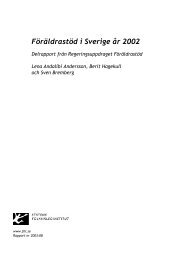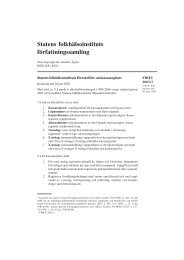Skydd mot smittspridning. Kunskapsunderlag för Folkhälsopolitisk ...
Skydd mot smittspridning. Kunskapsunderlag för Folkhälsopolitisk ...
Skydd mot smittspridning. Kunskapsunderlag för Folkhälsopolitisk ...
You also want an ePaper? Increase the reach of your titles
YUMPU automatically turns print PDFs into web optimized ePapers that Google loves.
Summary<br />
objective domain 7: Protection against communicable<br />
diseases<br />
Knowledge base for the public health policy report 2010<br />
this sub-report is one of several background reports to the Swedish Public Health<br />
Policy Report 2010. Here, we provide a more detailed picture of developments in<br />
objective domain 7: Protection against communicable diseases. The report highlights<br />
the occurrence of antibiotic resistance, immunity and infectious agents, and<br />
effect of these factors on our protection against communicable diseases and the<br />
health of the population.<br />
Antibiotic resistance, immunity and infectious agents are all factors that fundamentally<br />
determine the health of the population and society’s protection against<br />
communicable diseases. These factors were all selected in 2005 when working on<br />
the Swedish Public Health Policy Report 2005. Indicators used for the follow-up<br />
of these factors are the annual incidence of antibiotic resistance (methicillin-resistant<br />
Staphylococcus aureus, MRSA), annual monitoring of the childhood vaccination<br />
situation (vaccinations against measles, mumps and rubella), and annual<br />
cases of continuously surveyed diseases through statutory notifications according<br />
to the Communicable Diseases Act (chlamydia infection, HIV infection, hepatitis<br />
B, and legionella). Antibiotic resistance complicates and prolongs treatment, and<br />
causes increased mortality. Antibiotic resistance also causes increased medical costs.<br />
Vaccination has proven to be one of the most effective medical interventions available,<br />
and the vaccines included in the Swedish national vaccination programme, has<br />
almost completely removed the morbidity and mortality caused by these diseases.<br />
At the same time, outbreaks of measles in Europe show that vaccinations do not<br />
reach all children. This also shows the importance of cooperation between countries<br />
for adequate immunization coverage. Infectious diseases caused 26 per cent of total<br />
mortality in the world in 2001.<br />
Since the Public Health Policy Report 2005, antibiotic resistance has increased.<br />
The number of reported cases of MRSA (as well as other resistance monitored pursuant<br />
to the Communicable Diseases Act) has increased every year. An important<br />
change is that the endemic cases of MRSA are now spreading primarily in the community,<br />
affecting new groups such as children and young adults. In addition, several<br />
new types of resistance have evolved and spread. Here, the intestinal bacteria with<br />
carbapenem resistance and gram-negative intestinal bacteria that produce ESBL are<br />
particularly important since some are completely resistant to existing antibiotics.<br />
M å l o M r å d e 7 – S K Y d d M o T S M I T T S P r I d n I n G 9

















